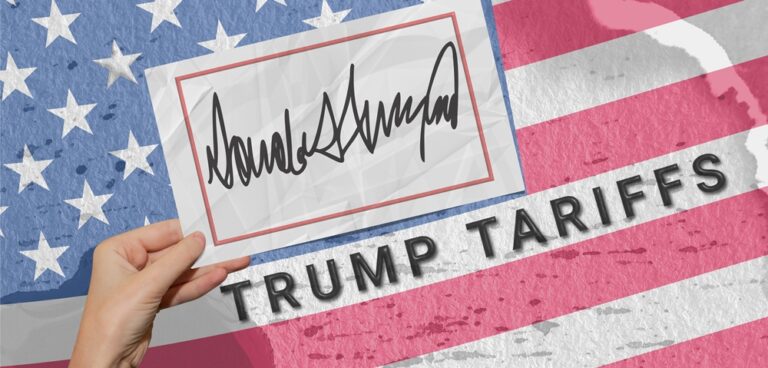
For the first half of April, Trump’s tariffs dominated global headlines, triggering both diplomatic tensions and volatility within key markets. While Trump has now paused his tariffs on most of the world for 90 days, it’s impossible to assuage fears of economic disruption. Yet, for some small, local businesses, there could be unprecedented opportunity in this otherwise turbulent act of economic violence.
Where we stand
In April this year, Trump invoked the International Emergency Economic Powers Act (IEEPA) to impose a 10% universal tariff on all imports, citing national security concerns and trade imbalances. The move was swiftly followed by targeted, punitive tariffs – most notably rising to 145% on Chinese goods. The semiconductor industry, amongst others, now face further scrutiny, as well as potential escalations.
These so-called protectionist measures have elicited strong reactions – and rightly so. These are not minor tweaks or tactical shifts but something that could cause inordinate economic damage, distorting trade, pushing up prices, and complicating supply chains. Indeed, economist Ray Dalio likened Trump’s tariffs to “throwing rocks into the production system”, whilst the UK’s Chancellor, Rachel Reeves, has called for a global response to shield the British economy.
The greatest threat in all of this is not just the tariffs themselves, however, but the sheer unpredictability they introduce. Instability and uncertainty can prove deeply damaging to businesses of all sizes, which will struggle to adapt without the clarity needed to make decisions, plan, and accurately allocate future resources. Indeed, companies need assurance and a clear view of both the current and future climate in order to take any kind of executive action – so, the fact that this has been taken away so abruptly, with zero guidance on what may change or how quickly, puts leaders in the worst possible position when it comes to strategy.
Small-scale resilience
Multinational corporations are likely to be hit particularly hard by US tariffs, given that they’re especially vulnerable to supply chain shocks and trade policy shifts on a global level. As such, small, local businesses may suddenly find themselves better positioned to respond more quickly than the traditionally dominant, large-scale competition. It’s a bitter-sweet silver lining. No one wants to celebrate the terrible impact Trump’s tariffs might have on international and multi-national corporates. Yet, it is true that smaller companies are naturally more resilient to the price shocks that tariffs can trigger, potentially leaving them in a stronger position than before.
This is not to say that things will be easy. Tariffs cause real damage – and no business is immune to the ripple effects of economic policy changes. Nevertheless, independent businesses do have a significant advantage: the ability to pivot and pivot fast. Without being burdened with layers of bureaucracy and hierarchy like their larger counterparts, these companies can rapidly adjust their offers, localise more of their supply chains and target newly opened markets with relative speed – with this agility proving a powerful, profit-driving asset even in such uncertain times.
Turning tariffs into chances
In some cases, then, the new tariffs could actually open doors. For instance, a British bottled water brand could find new traction in the American market if French and Italian competitors become too expensive to import. Likewise, UK manufacturers previously undercut by low-cost imports from Vietnam or China could now find themselves competing on a more even playing field, giving smaller players a chance.
Whilst the UK government has not imposed any new tariffs on US goods as of yet, there have been rumours of countermeasures – potentially targeting American goods like whisky, jeans and motorbikes. Any kind of implementation in these areas could empower British companies in these sectors to fight back, potentially reaching a much larger domestic audience willing to exercise their spending powers a bit closer to home. Whilst none of this offsets the overall disruption, it does point to the importance of creative thinking and proactive strategy, where independent businesses that are dealing with fewer layers of authority and much shorter decision-making chains will be best placed to identify and seize any emerging opportunities.
Supporting the small and mighty
To help small companies better capitalise on this potential break in the clouds, the Government must seriously reconsider support. By using some of the revenue from new tariffs to ease the recent increase in National Insurance contributions, for example, Labour could shift some of the burden towards imported goods – especially those now subjected to higher tariffs – without adding more unnecessary pressure on small-scale employers otherwise capable of driving growth for the economy. This wouldn’t eliminate the impact of global policy shifts, but it could soften the blow for smaller businesses and redistribute the economic load as part of a fairer, more growth-oriented approach.
Embracing a local future
As we spiral towards an increasingly uncertain economic future, it can be tempting for small business owners to wait the volatility out. However, in order to survive and thrive, companies must be ready to act in the moment – whether this means exploring new routes to market or learning to leverage local heritage as their competitive strength. It’s all about remaining agile at a time where the only constant is unpredictability, taking on expert guidance from those well-versed in small business to make the most of any emerging opportunities, regardless of the consequences that brought these about.
Yes, tariffs are messy and, oftentimes, wholly unfair, producing long-term effects that are impossible to predict – and yes, the certainty that we currently lack will always be an imperative for successful business. Yet, hidden in all that disruption is a real opportunity for local businesses to own their niche, as governments act fast to refocus the economy by doing everything it can to support them. Whatever happens, homegrown firms will be key to surviving this era of protectionism – which is why it’s so imperative that authorities and experts alike must step up, going above and beyond to protect and support those businesses that stand to gain the most.
Author: Guy Hayward, Founder and CEO of independent marketing agency for SMEs, Local Heroes


